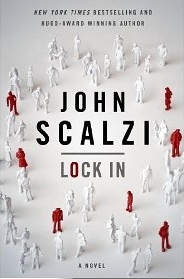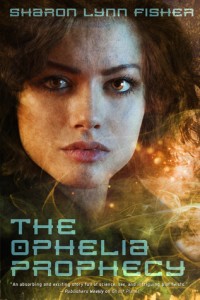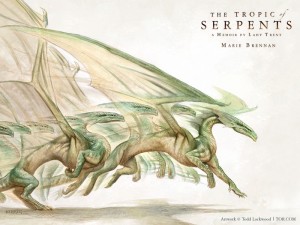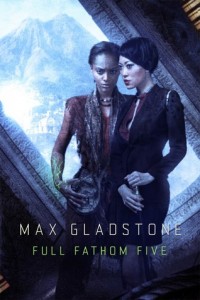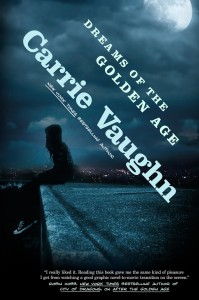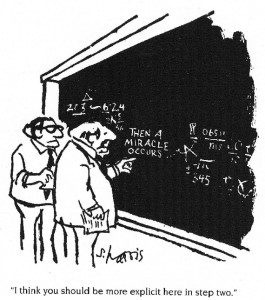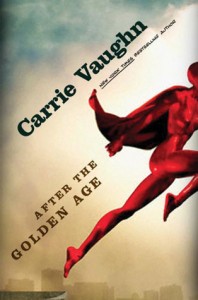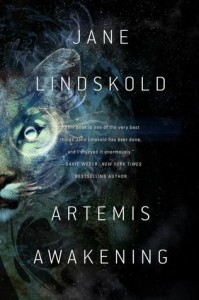 Format read:
Format read: ebook provided by Edelweiss
Formats available: ebook, hardcover, audiobook
Genre: Science fiction
Series: Artemis Awakened, #1
Length: 305 pages
Publisher: Tor Books
Date Released: May 27, 2014
Purchasing Info: Author’s Website,
Publisher’s Website,
Goodreads,
Amazon,
Barnes & Noble,
Kobo,
Book Depository
The distant world Artemis is a pleasure planet created out of bare rock by a technologically advanced human empire that provided its richest citizens with a veritable Eden to play in. All tech was concealed and the animals (and the humans brought to live there) were bioengineered to help the guests enjoy their stay…but there was always the possibility of danger so that visitors could brag that they had “bested” the environment.
The Empire was shattered in a horrific war; centuries later humanity has lost much of the advanced technology and Artemis is a fable told to children. Until young archeologist Griffin Dane finds intriguing hints that send him on a quest to find the lost world. Stranded on Artemis after crashing his ship, he encounters the Huntress Adara and her psych-linked companion, the puma Sand Shadow. Their journey with her will lead Dane to discover the planet’s secrets…and perhaps provide a key to give unimagined power back to mankind.
Cass: So where should we start? The Good, The Bad, or the What the Fuck?!
Marlene: I think the WTF comes at the end.
Good first, then bad, then OMGWTF.
Cass: Alright then, onwards to the awesome! Artemis Awakening has some spectacular world-building. I loved the entire concept of a pleasure resort planet (which, let’s face it, rich folk would totally build), and the amount of work they put into making it the best vacation ever. Can’t have nasty insects ruining our fun times! Or diving guides that needed to breathe underwater! Or locals who have any kind of ambition or interest in technology/offworld societies.
It was incredibly well thought out, and also terrifying to realize how deep they went in building their little pleasure palace. So much so that the behavioral modifications were still in place 500 years later.
Marlene: Westworld meets Risa, but with perfectly engineered people and animals instead of androids that can go haywire. Except wait, that happened too.
But seriously, the amount of time, effort, money, science, etc., that has to have gone into building Artemis is both fascinating for what it says about the original Empire and extremely well done on the part of the author. Everything was designed to provide the perfect vacation experience for any wealthy and well-connected member of the upper crust.
It made me wonder if part of the reason that the empire imploded was because they were spending too much money on the wrong things, and not taking care of business. I also wonder if this perfect pleasure planet included sex workers (or people programmed to be) but that wasn’t in evidence.
Cass: Actually, I’d disagree with you there. In the beginning when Adara (our protagonist) was trying to decide how to behave with the first extraterrestrial visitor in 500 years, she was thinking about how they were known to fuck around with the locals. AND the comments made by her pseudo-love interest (which I have opinions on), where he explained that he felt compelled to defer to any attraction Griffin may have felt towards her…..
I’d say the breeding for compliance and happy servitude definitely spilled over into a form of prostitution – though not something these Rich Swine would think of as actual sexual slavery.
Marlene: I don’t think the locals were programmed to say “no” to the “seegnur”, either. But in all of Adara’s thoughts about it, she felt that it would be either taking advantage of her, or not what she wanted for herself. Rich Swine wouldn’t care, and would tell themselves that it was alright. But I wonder if there was an adaptation for brothel-workers?
Cass: Super-immunity to STIs? Mental control over fertility? Vibrating cocks? Seems like those would be adaptations that wouldn’t get you shunned.
Which was another thing I loved about the world-building! How the people of Artemis had divided up into classes based on their modifications (or lack thereof) that they kept to even in Adara’s time – and how a farming family would freak out when their kid sprouted claws or gills, no matter how useful the trait could be to have around.
Marlene: The idea that the behavior modifications would still be breeding true, to the point where the entire society still followed the rules laid down by the “seegnur” was awesomely scary.
Cass: At first it was irritating me. I was sitting here thinking “Adara is a take charge kind of woman, why wouldn’t she rebel against these kinds of ridiculous constraints.” But then we started seeing so many indications that people really couldn’t move beyond a need to serve. Which, of course, led many adapted children open to being horrifically abused and taken advantage of by The Old One Who Is Young Without The Benefit of Plastic Surgery.
Marlene: We can’t start talking about The Old One Who Is Young Without Learning a Damn Thing without talking about the story and the characters.
Griffin Dane crashes on Artemis, and discovers that none of his backup systems work and he’s stranded on what he thinks is a primitive planet with no way of contacting “civilization”. And he’s rescued by a woman with a puma. He thinks he’s landed in savage heaven, especially after she saves his bacon.
Cass: A puma with HANDS. Everyone stop and think for a moment about the terror of a world in which cats have opposable thumbs. The lack of which is pretty much the only thing currently saving us from feline domination.
Marlene: Nothing is saving us from feline domination. Trust me on this. However, their lack of opposable thumbs does mean that they think we are useful, so they have refrained from wiping us off the planet. As soon as they figure out how to open their own cans, we’re done for.
(M: My husband is curled up in the corner in a fetal ball gibbering about cats with hands) (C: Excellent. I knew that bit would strike terror into the hearts of all who know cats)
Cass: Essentially, Griffin is your typical absent-minded professor type, totally unprepared for the realities of Artemis, and we learn about the world through his eyes – and also how Adara sees him. Along the way we meet up with Adara’s pseudo-boyfriend (A GODDAMN LOVE TRIANGLE APPROACHES), and The Old One Who Is A Young Asshole. (Spoiler alert! He’s an asshole.)
I think we’re really started to edge over into the bad, so let me just say, that much like the world-building, the author did a fantastic job with the characters. With one exception that I will harp on at length. Later.
Marlene: The dreaded love triangle, which almost becomes a quadrangle (or a pentagon if you count the puma) doesn’t actually come to fruition. So points for not totally going there.
Cass: The puma had the right idea. Three-way. I suspect they might go that way in the next installment after some spoilery things that manifested between Adara’s almost boyfriend and her extraterrestrial meet-cute.
But other than that, there was no point in even bringing it up. Wah, Adara’s indecisive, wah, the menfolk can’t tell if she’s into them, wah, wah wah. Just fuck them and move on or shut up about it already! There are so many more important things going on.
Marlene: One last wah. Wah Adara’s heart was broken by her asshole ex, who, based on the songs that he wrote about her, is seriously psychopathic. He’s one sick dude.
Cass: The songs and his post-Adara career choices. I was kind of trying to block that part out. I’m sure in the next installment he’ll make an appearance right around the time she’s actually going to get some with one of the other guys.
Marlene: I expect him to kidnap her at some point in a later installment and try to enact one of those songs. (shudder)
However, in spite of her poor taste when she was young and stupid, I like Adara. She’s intelligent and strong, and doesn’t fall into bed with either of the two dudes sniffing around her as a cure for her angst. Also she distrusted The Old One Who Is a Sociopath when she was 8, and she doesn’t like him any better now.
Cass: I loved Adara analyzing The Old One Who is a Men’s Rights Activist’s reactions to her and figuring out that he was a misogynist who knew he had no hope of controlling a child (or woman) who could grow claws at will. Hah! In fact, I kind of wished he hadn’t been smart enough to figure that out – because Adara could have demonstrated for him.
Marlene: The “facility” that The Old One Who is a Torturer had created reminded me of the human/Cylon breeding facilities on Battlestar Galactica. And OMG that was sick then and it’s sick now.
Cass: I’d say this one trumped the horror of BSG because we got a vivid-full-color description of how The Old One Who is a Butcherer handled his “failures.”
Marlene: I think we’ve reached the point where we need to talk directly about The Old One Who We Hate So Much.
Cass: The Old One Who Is Young:
- Is inexplicably young despite being centuries old and NO ONE, not even Griffin, ever fucking questions how this is possible.
- Is inexplicably able to commit atrocities with impunity and command people who hate him.
- Is a cardboard cut-out villain. (Unlike Adara’s ex, who though uber-creepy, at least appears to be acting in character.)
Basically all those good things we talked about earlier? The world-building? The characters? All fall apart with our villain. He makes no sense in the context of the world, he isn’t given any kind of motivation, and nobody even attempts to figure out WTF is with all the WTFery.
Marlene: The Old One Who is the Villainiest Villain of Them All is too much of a “bucket of all evil”. What the hell is he? An adaptation that went wrong? A “seegnur” who got left behind? (Probably not, but I did wonder for a while). An incredibly organized serial killer? (Well yes, he is definitely that)
Cass: We should just call him “He Who Must Not Be Named” and be done with it.
Marlene: Voldemort with a touch of Sauron, in the body of Jack the Ripper or Sweeney Todd.
Cass: I was thinking Voldemort trapped in Young Voldemort’s body as raised by post Red-Wedding Walder Frey. A Senile “Seegnur” who had nothing to do for centuries than think up atrocities to top those in the history books. (You had to have noticed they talked about a Red Wedding in the beginning of the book? I was totally laughing when I realized I could start counting ASOIF references).
Marlene: I had not thought of the possibilities for ASOIF bingo, but you’re right. OMG.
Cass: We could call him…. Seegdemort Frey? I always envisioned Hogwarts as a creepy breeding facility anyways. Artemis Awakening’s villain is Harry Potter Meets Game of Thrones. Yes, I know I just broke all your brains, but that is because IT MAKES NO GODDAMN SENSE.
Marlene: All high schools have the possibility of being creepy breeding facilities if you squint.
Cass: Yeah, but Hogwarts specifically divided them up by specific traits. For breeding purposes. The Sorting Hat is only looking at genetic compatibility and potential offspring….
Or are we getting a little off base?
Marlene: I just think we’re in danger of being longer than the original book we started with!
Cass: Well, we can’t really explain The Old One Who Wants To Be A Frey When He’s All Growed Up without getting into spoiler territory….so…..
Escape Grade: B+. Yeah there was a lot of omgwtfbbq at the end, but the beginning was awesome, and I’ll totally pick up the sequel to see what happens when Artemis starts taking an active interest in events.
Marlene: Escape Rating B+: The villain was a bit too much the Nazi version of Snidely Whiplash, but the characters and the worldbuilding were extremely awesome at the beginning. Especially Sand Shadow the puma, as much as she worries me about the evolution of cat-kind. I enjoyed Adara’s not falling into bedroll with either of the two dudes on offer, and I want to see her come into her own. And I sincerely hope that the next book in the series (which I will definitely pick up) tells us more about The Old One Who is a Nazi and where he came from and how he got that way. And hopefully we see his complete comeuppance.
Cass: Hey, look at that! We agree. Most unusual.
Marlene: We get closer to the same page when there’s no mushy stuff.
Cass: Well, no mushy love stuff, there were plenty of mushy… other stuff… and such in this book.
Marlene: We agree on gore, just not on kissy-face.
Cass: I’m still pulling for the three way in book 2. Sand Shadow is clearly the dominant character. They should follow her suggestions.
Marlene: Definitely Sand Shadow for the win!
***FTC Disclaimer: Most books reviewed on this site have been provided free of charge by the publisher, author or publicist. Some books we have purchased with our own money or borrowed from a public library and will be noted as such. Any links to places to purchase books are provided as a convenience, and do not serve as an endorsement by this blog. All reviews are the true and honest opinion of the blogger reviewing the book. The method of acquiring the book does not have a bearing on the content of the review.
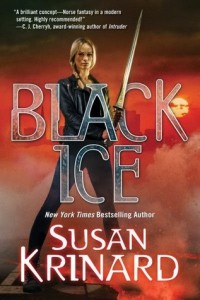 Format read: ebook provided by Edelweiss
Format read: ebook provided by Edelweiss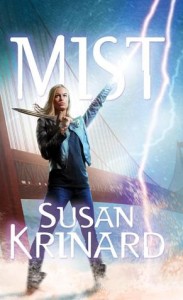 Black Ice is the followup to the first book in this series, Mist (reviewed here). I can definitely say that the title of this latest entry is appropriate, not just because there is literal “black ice” in San Francisco (in June!) but also in the sense of “things are always darkest just before they turn completely black”.
Black Ice is the followup to the first book in this series, Mist (reviewed here). I can definitely say that the title of this latest entry is appropriate, not just because there is literal “black ice” in San Francisco (in June!) but also in the sense of “things are always darkest just before they turn completely black”.
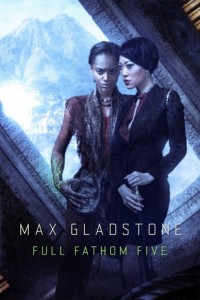
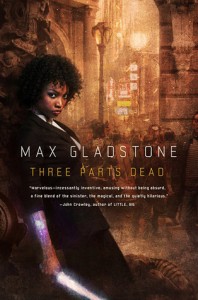 The lawyer/necromancers are back in this third book of the Craft Sequence, after Three Parts Dead (reviewed
The lawyer/necromancers are back in this third book of the Craft Sequence, after Three Parts Dead (reviewed 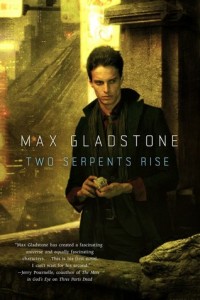 In the series, we’ve seen the rise and fall of deities (Three Parts Dead), the near catastrophic loss of a technology based corporation that provides power in the place of any deities (Two Serpents Down) and in Full Fathom Five we see the middle-option; fake deities (literally idols) as a way of putting oneself outside either of the other systems.
In the series, we’ve seen the rise and fall of deities (Three Parts Dead), the near catastrophic loss of a technology based corporation that provides power in the place of any deities (Two Serpents Down) and in Full Fathom Five we see the middle-option; fake deities (literally idols) as a way of putting oneself outside either of the other systems.

